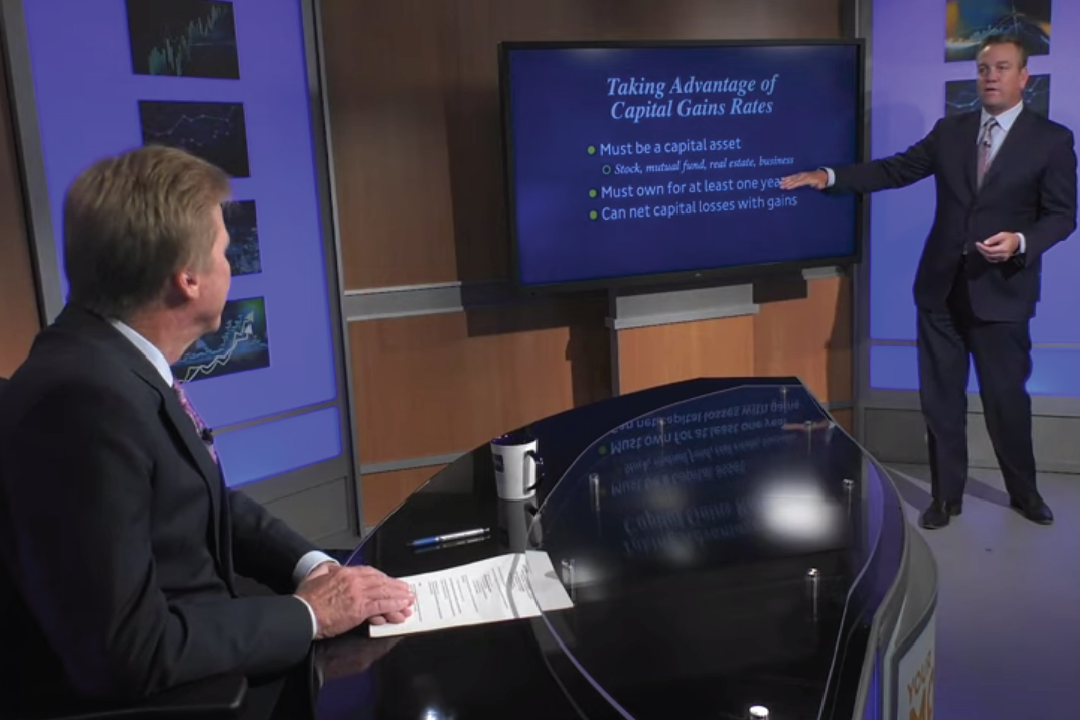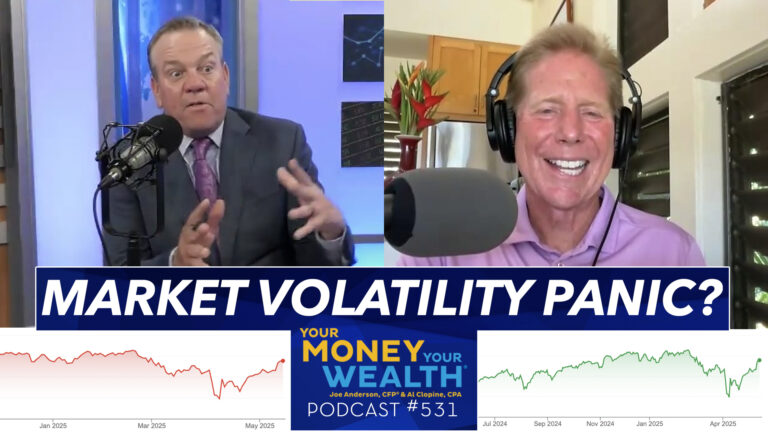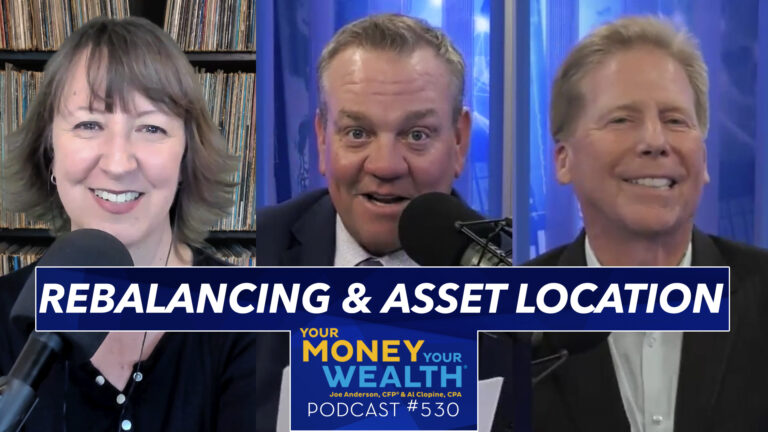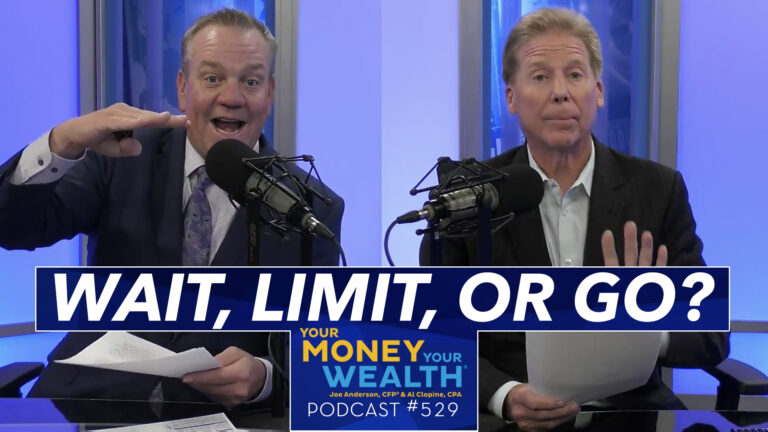Does it matter if you put retirement savings in the older spouse’s accounts first? Does Marion have a good VTSAX to VTWAX tax-loss harvesting and portfolio rebalancing strategy? Plus, Joe and Big Al help you make sense of fees – both from your financial advisor and on exchange-traded funds, or ETFs. Big Al will provide pointers on selecting a good certified public accountant – other than him, of course, and finally, do 457 plans ever blow up?
Subscribe to the YMYW newsletter
FOLLOW US: YouTube | Facebook | Twitter | LinkedIn

Show Notes
- (00:46) Retirement Savings Strategy: Should You Save In the Older Spouse’s Accounts First?
- (09:32) How Is My Tax Loss Harvesting Portfolio Rebalancing Strategy?
- (15:53) Making Sense of Advisor Fees and ETF Fees
- (22:14) How Do I Assess a Certified Public Accountant?
- (28:08) Do 457 Plans Ever Blow Up?
Free resources:
SPECIAL OFFER BOOK | Ignore the Hype: Financial Strategies Beyond the Media-Driven Mayhem (*limited time only!)
WATCH/READ | Benefits of Portfolio Rebalancing
WATCH |YMYW TV: Don’t Let the Tax Man Ruin Your Retirement


READ THE BLOG | Decision 2020: Your Vote and Your Money

Listen to today’s podcast episode on YouTube:
Transcription
Does it matter if you put retirement savings in the older spouse’s accounts first? Does Marion have a good VTSAX to VTWAX tax-loss harvesting and portfolio rebalancing strategy? These are the main topics today on Your Money, Your Wealth®. Plus, Joe and Big Al help you make sense of fees – both from your financial advisor and on exchange-traded funds or ETFs. Big Al will provide pointers on selecting a good certified public accountant – other than him, of course, and finally, do 457 plans ever blow up? Go to YourMoneyYourWealth.com and click Ask Joe and Al On Air to send in your money questions. I’m producer Andi Last, and here are the hosts of Your Money, Your Wealth®, Joe Anderson, CFP®, and Big Al Clopine, CPA.
Retirement Savings Strategy: Should You Save In the Older Spouse’s Accounts First?
Joe: Alan, we got Jeremy. He writes in. He’s a supply chain manager. I don’t know why- I guess this is a new requirement that we’re asking now what their occupation is? Is that what are you doing Andi?
Andi: No, that one was just volunteered to us by Jeremy.
Joe: He’s from Cookeville, Tennessee, so supply chain manager. I don’t know what a supply chain manager does- manages the supply chain. Wonder what type of-
Al: Yeah that’s exactly right.
Andi: He makes sure you get your widgets.
Joe: Very smart.
Al: That’s essential _____ supplies, I’m sure.
Joe: Watch out. “Andi, Joe, Big Al. Thanks for all you do educating your audience. I sincerely appreciate the ability to explain complex concepts in a way it’s easy to understand. I also appreciate the occasional derails and comic relief. It’s a good balance. I’ve learned a lot in a short amount of time thanks to your podcasts. Most notably I didn’t know until hearing it on your show that I can withdraw from my 401(k) without penalty starting at age 55 if I separate from the company that operates the 401(k) plan during that 4 and a half year window prior to 59 and a half.” This is a big deal since he plans to retire a little early so 55 separate from service at age 55 you have full access to a 401(k) plan as long as you don’t roll the 401(k) plan to an IRA, then you have to wait till 59 and a half. So he’s got a question, Al.
Al: Well and before we do, let’s be clear on that because if you have a 401(k)- an old 401(k) from another employer that’s doesn’t qualify for the special rule; it’s only your existing 401(k) with your existing employer, if you retire after age 55, then you can withdraw the money. Of course, you will pay taxes on it but you won’t pay the 10% penalty.
Joe: “So my question today is related to retirement savings for my wife and me. I’m 42, wife’s 35. We invest 15% of our income into retirement accounts; 12% into my 401(k); and the other 3% in a Roth that is in my name.” So nothing for the wife here, Al. Totally-
Al: No.
Joe: Just it’s all him. Jeremy, the supply chain guy. He’s-
Al: Well, I know what he’s talking about.
Joe: He’s managing the supply-
Andi: – of money?
Joe: – of retirement account in the family household it sounds like. He’s taking work home with him.
Al: Apparently there’s money in supply chaining.
Joe: He’s killing the game. “We do not save any money into accounts for my wife because she’s 7 years younger and so we feel that we would have to wait an extra 7 years to be able to access the money without penalty. I’d be 66 when she turns 59 and a half and I believe that we would want to start drawing down earlier than that; potentially as early as when we’re eligible for withdrawal of my 401(k) at 55.” Well, she would be eligible too, Jeremy, at 55. It’s not only supply chain managers get this rule. You know what I mean?
Al: That’s right.
Joe: So if she saved money into her 401(k) plan and if she separated from service at her age 55, you’re still good to go. “We plan to invest into accounts for her until we max out the 401(k) and Roth accounts but we’re only about halfway there so still room to run. My wife works but her company does not offer any kind of matching program for retirement. I should also mention that my wife is named as the beneficiary.” Wow. What a nice guy. Oh, well, thank you. I’m sure she’s like well thank you.
Al: That’s novel.
Joe: Very. Yes.
Al: That your wife is beneficiary.
Joe: It’s crazy.
Al: That’s really sweet.
Joe: I think this is the first time I ever heard of that.
Al: I could feel the romance from here for doing that. That’s awesome.
Joe: Even though by law the wife has to be a beneficiary. She has to sign off on it, Jeremy.
Al: Yeah. Right. If you want to do something other than-
Joe: Well I don’t know. I guess for the lack of equality. I mean if there’s not- he’s 42 right and he’s looking at we’re going to retire at 55 so he’s got a 10 to 12 year timeframe, 13 years something like that; supply chain manager saving 12%. First off, to retire at age 55, depending on what Jeremy’s spending, you might need to save more than the 12%. So he’s going to have to have his wife save a little bit of cash into her 401(k) plan. So the first step I would do is kind of do a forecast this way, is saying here’s how much money that I’m spending. Let’s say Jeremy spends, I don’t know, $60,000 a year. Where does he live?
Andi: Cookeville, Tennessee.
Joe: Tennessee. I don’t know, him and the wife, maybe $75,000. Cookeville, that’s a pretty nice place. Then you look at I want to retire in 15 years. So you take your $75,000 living expense and then you use some inflation factor, maybe 3% from age 42 to age 55, and see what that $75,000 comes out to. Let’s just assume it’s $100,000. I’m guessing. I don’t have a calculator in front of me. So if he wants to spend the same lifestyle in retirement at age 55 and he has $100,000 that he’s normally spending, well he’s going to need a few million bucks in his overall retirement account to provide that type of lifestyle. Especially if you’re trying to bridge the gap from 55 to age, let’s say 67, to his full retirement age where he’s going to receive Social Security benefits. So that’s a 12 year gap where he’s going to have to produce 100% of the income. So that’s the starting point to say, am I on track? Am I even saving enough? So is 12% enough? Is it 15%? Is it 20%? Does he have to max out his plan and the wife’s plan, God forbid? And then so she’s going to have to name him as beneficiary. Can you believe that? There’s gonna be some _____ conversation.
Al: Yes. She may or may not. She may pick another person. I think that’s good advice because-
Joe: It’s not advice. We’re just- it’s conversation.
Al: OK that’s good conversation. You’re right.
Andi: Good suggestion?
Al: – suggestion. That’s always the first step is when you figure out if you wanna retire at age 55 you got to work backwards and do a little math and figure it out, are you on track to do that? And assuming that they are- although I would agree- saving 12% to 15%, I guess 15% total. That’s a good number, Joe. But it may not be enough to retire 10 years earlier than other people if people retire at age 65. So you just have to figure out whether they’re on track for that. But I’m going to take this maybe a little different direction in terms of, if you only have so much money to invest in retirement accounts, should you favor the spouse that’s older? And I think that’s not necessarily a bad idea because the spouse that’s older will have access to those funds penalty free earlier. So probably in this case you’re going to want to both save, I agree, to be able for Jeremy to retire at age 55. But if you only have so much money, you might want to kind of favor that spouse that’s a little bit older, particularly because his wife doesn’t have matching in her retirement account.
Joe: But do you want to look too at, what does the 401(k) look like? What fund choices do they have? What are the fees? Where the expense ratios? Things like that. Roth accounts however though, they have full access to that money at any point, of the contributions anyway, prior to 59 and a half. So if you do want to retire early folks, you could even retire at 50 and have full access to Roth IRA contributions. There is no penalties or taxes on the contributions if you choose to take them out. We would probably suggest not to do that, but that is a way to get penalty free cash if you’re in a pinch. So interesting question, but we appreciate it. Thanks a lot from Cookeville, Tennessee. Just keep managing those supply chains Jeremy, appreciate it.
How Is My Tax Loss Harvesting Portfolio Rebalancing Strategy?
Joe: How about Marion?
Andi: Who is now signing them Clovis/Fresno.
Joe: Clovis/ Fresno.
Al: Well they’re right together.
Joe: Marion. All right. “Hi Andi, Big Al and Joe. Is this a reasonable strategy or too complicated? Each year, create a taxable event by selling my VTSAX mutual fund shares that have a long term capital gain. This amount is taxed at 15%. My tax bracket is 22%. When there is a major downturn in the market then sell my VTSAX mutual fund and buy VTWAX, a substantial different mutual fund thus creating a tax loss to offset my ordinary income in the 22% tax bracket?” No, it’s not too complicated. But let’s talk about Al, what she’s doing here. So let’s say- forget about the timing aspect. When the market goes down and the market goes up and this and that don’t try to time it just put bands on it. It’s called rebalancing or tax loss harvesting is what she’s actually referring to, which can be complex. But if you hold a mutual fund at $10 a share and it goes down to $7 a share and you sell that mutual fund and you buy something similar. It can’t be identical, it needs to be different but it could be somewhat similar. So then she creates a tax loss of $3 per share. So that tax loss then will carry over until there’s a gain during that year. If there is no gain then she can offset ordinary income up to $3000. So that’s kind of the premise of harvesting losses is that you can continue to harvest losses because those losses will offset gains and to- If there is no gains then you can write off against ordinary income up to $3000.
Al: Yeah and then the rest of your loss carries over to the next tax year and the following year after that and the following year after that.
Joe: But her question is, each year create a taxable event by selling her mutual fund shares that have long term capital gains. So she’s going to go I’m gonna sell a mutual fund that has long term capital gain. So then I have a capital gain. This amount is taxed at 15%. Yes. So any capital gain is taxed at 15% or zero or 20% depending on what tax bracket they’re in. Marion is in the 22% tax bracket. So when there is a major downturn in the market, sell my fund, buy another one and thus create enough tax loss to offset my ordinary income. So there’s a little confusion- because if you sell at a tax gain, so that’s a capital gain. The tax loss will offset the capital gain dollar for dollar for how much loss or gain that you have. If you have more loss than gain, you will offset the gain, but then any additional will offset ordinary income to a cap of $3000. If she has a- or he- is Marion a boy or a girl? We don’t even know.
Andi: We do this all the time. Marion is female.
Joe: Okay. MarioRebalanvn, let’s say has a $100,000 loss and has a $50,000 gain. That would be offset dollar for dollar. So if she had a $50,000 gain, $100,000 loss. There is no tax on the gain. Because she had $100,000 loss, there’d be a $50,000 loss carryover. But she can’t write all $50,000 against ordinary income, only $3000 of the $50,000 would be offset ordinary income. And then $47,000 would carry over the following year depending on if she had any other capital gains or not. If she had more capital gains, she could offset it with her loss. If there was no gains in her brokerage account she would then take an additional $3000 off ordinary income. So it seems that she’s kind of getting confused in regards to the ordinary income, what’s offset, what’s not, so capital loss versus capital gain, anything more than that will be carry it over for until she uses it. And yeah, Al’s-
Andi: I think we just lost Al.
Joe: I don’t know.
Andi: Oh, he’s back.
Al: Can you hear me now?
Andi: Yes.
Joe: We can hear you now.
Al: You guys froze. The part I heard Joe, sounded right.
Joe: Perfect.
Andi: We continued on. You froze on us.
Click the link in the description of today’s episode in your podcast app to visit the podcast show notes at YourMoneyYourWealth.com to learn more about rebalancing and tax loss harvesting. I’ve posted some blog and video resources including the YMYW TV episode, Don’t Let the Tax Man Ruin Your Retirement. You can also download 8 Timeless Principles of Investing for free and read the final installment of Brian Perry’s blog series, Decision 2020: Your Vote and Your Money on how to election-proof your retirement portfolio. It’s all int he podcast show notes at YourMoneyYourWealth.com, and it’s all courtesy of Pure Financial Advisors. No thanks necessary, but if you really want to say thanks, the best way is to share the YMYW podcast and all the free resources so that others can laugh and learn too.
Making Sense of Advisor Fees and ETF Fees
Joe: “Hello Joel-” thank you for that.
Al: in parenthesis (Joe).
Joe: Yeah. “- Big Al and Andi. Marcus here from Tennessee/Alabama.” Well Marcus, it’s been a while since we’ve chatted. Roll Tide. Great show as always. Keep up the excellent work. Below are my questions to keep short. I’ll send another email a week later. Can’t promise that won’t be short. Please discuss how expense ratios on ETFs are paid.” ETF, an exchange traded fund he’s referring to, Alan. “Can you calculate the average portfolio expense ratio by taking the average of the ETF expense ratios inside a portfolio? If someone has an actively managed portfolio with an advisor that uses a 1.14 AUN model and this portfolio has an average expense ratio of 1.03, then is this person paying 2.17% in fees? I’m trying to get clarity on one of my mom’s accounts. When asked about fees, her advisor said ‘your total program fee for this account is 1.14%’. But I see these expensive ETFs in there as well. I could simply ask him the question since he’s the advisor, but where in the fund would that be? Thanks again.” All right, so a couple things. When you’re looking at fees, there’s multiple fees that an individual pays if they’re working with an advisor or not. So an exchange traded fund, there’s different flavors of ETFs. 1.03% expense ratio on exchange traded fund portfolio seems fairly high to me. If they’re just following an overall index, those fees should be like .03%, not 1.03%. Because there’s very little-
Al: Yeah.
Joe: Right? .03%- .003%.
Al: And maybe they’re actively managed ETFs. That could account for a higher expense ratio.
Joe: Yeah. And I’ve seen some of that as well where you look at an exchange traded fund- the difference between an exchange traded fund and let’s say an index fund. There’s very little differences. It’s just like how you’re purchasing them and how they’re constructed. There’s some nuances there. Because mutual funds, you have one price, where an exchange traded fund you buy it like a stock. So it kind of depending on the price of the day. So anyway I don’t even know why I went there. But the fees on exchange traded funds are very, very low in most cases. So I would, Marcus, I would want to make sure that a) that if they’re charging 1.03% in exchange traded funds, then you’d need to make sure that you’re looking at what types of funds these are and tell your advisor, why am I paying 1.03% in exchange traded funds when I should be paying .03%? The advisor fee of 1.1%, 1.14%, that’s very standard within the industry. But I’m not sure why they’re selecting some of these ETFs unless they’re like leveraged. And if it’s your mom’s account- That sounds off to me. But yes, your math is correct, 2.17% in fees is what the total fee is for the portfolio, but the expense ratio for the exchange traded fund portfolio just seems a smidge high.
Al: That’s right. The math is right but there’s actually even yet another fee which is turnover. So the funds turnover- in other words, how often the securities inside the fund are sold there’s going to impact the cost as well. And that’s something that’s hard to figure out and usually let’s say a 1%- you know 100% turnover is like a 1% additional charge right there. So in other words if all the stocks are getting turned over the course of the year, you might have another percent on top of this 2.17%. So you got to look at that too.
Joe: You would want to go to the statement of additional information. So you get the prospectus of course that we all read and then you have to ask for another document to really see the true fees. So that’s the statement of additional information. But then there’s also buy and sells. So if they’re buying and selling exchange traded funds- This could be a wrap account. So they’re saying well no the total fee is 1.14%. So you’re not paying for any of the trading costs, we’ll bear those costs versus if it’s not, you get the 1.14% plus the expense ratios, plus any type of trading costs that happen within the portfolio. So understanding fees is important but I would look at, are you sure she’s in exchange traded funds? If she’s an average mutual funds or actively managed mutual funds versus exchange traded funds- because there’s not that many actively managed ETFs, and the actively managed ETFs are based on like algorithms. So they’re still following an index and sometimes the company itself will create their own index. And so they’ll say we want to tilt this overall ETF more towards companies that have low price-to-book ratios or something like that. And they’re more value orientated or they’re more growth or they’re more small or they’re micro or we’re only going to focus on health care. But they’re still buying a basket of stocks. You’re not actively trading- the algorithm is on the purchase. So it just seems high anyway. I don’t know. Anything else to add there?
Al: No, I agree with that. It does seem high. So yes, check into it.
How Do I Assess a Certified Public Accountant?
Joe: So we got a question- oh, Packer Backer Mike. “Hi Big Al. I love your show. Those other two who join you, Johnny and Amy, can listen to my question if they’d like.” Look at Packer Backer Mike. What a-
Al: Yeah right.
Joe: – bite my tongue.
Al: He did that just to get you.
Joe: Yeah.
Al: And it worked.
Joe: “I’ve been a DIY for my finances and taxes all my life.” I guarantee Packer Backer Mike has got $60,000. He needs a ___ and he’s like 73 years old. He’s probably made $200,000 for the last 20 years. He’s a spender. Let’s see, I forgot where I was. “I plan to retire sometime in the next two years and would like a transition to a CPA who can not only prepare taxes but assist with some tax planning. What should I look for in a personal CPA? What questions should I ask? Love the show. Packer Backer Mike.”
Andi: “- and the irreverence that comes along with it.” you didn’t say because irreverence is too long.
Joe: It’s too long.
Al: You didn’t want to say that.
Joe: I didn’t’ want say that, yes, I didn’t want to fumble. “Go Pack go.” So he knows I’m from Minnesota so that’s why he’s saying that, because I’m a Minnesota Vikings fan. Go ahead Al. Help Packer-
Al: Packer Backer Mike. So you want a CPA. So I guess the first thing you probably ask around for some recommendations from your friends or if you don’t have anyone that knows a CPA, maybe go to Yelp. But a lot of CPAs don’t get reviewed. A lot of professionals don’t really get reviewed on that so it’s kind of, if you can, it’s kind of best to ask for some recommendations from people that you know, maybe two or three. When you start calling them up, ask them things like, well first of all what do they charge? I mean that’s very important. But in terms of getting a quality job from a CPA with tax planning, I guess just ask them how long they’ve been in business? What kind of clients they have? Are their clients similar to what your situation? Like if you’re a business owner or a real estate owner? Is that the kind of thing that they do? Find out if they do tax planning? Ask them do you do tax planning? And then if they say yes, ask them what does that mean? What kind of services can you expect? At yearend, are they doing tax projections? Or are they just sending you a yearend tax planning newsletter and then you have to kind of do it yourself? So I don’t think there’s any magical questions here other than just getting to know them. Find out, does their experience seem to be relevant to what your situation is? Is the cost reasonable? Have they been in business for a while? So that’s how I’d approach it.
Joe: Alan, when you had your CPA practice, what client would you rather have? A small business owner client? Or just a personal 1040?
Al: When I had my practice Joe, I would say a small business owner was kind of my forte-
Joe: Because you could charge more.
Al: Well that, plus I did a lot of business returns so I got good at that and when there’s business returns there’s more complex tax planning which I enjoyed. Because there’s interplay between the business and the personal return. So I ended up with a lot of just straight individual returns. I mean you normally do as well. I liked business owners. I further specialized into hi-tech companies, particularly software companies. I specialized-
Joe: I don’t want your whole resume. I’m just saying Packer Backer Mike here- I’m just given him a- I’ve never been a CPA and never had a practice. So if I’m looking at- let’s say the financial advisory space is that advisors want to work with people that have millions of dollars because they can charge their fee and they get more compensation for the work. But if you have a smaller client but then is asking for different things maybe CPAs don’t necessarily want to go down that path. So I could see why he’s looking for, what do you specialize in? I’m looking to retire. I want some ongoing tax strategy in regards to my retirement plan, cash flows and things like that. Do you do that? I would say most CPAs on an individual basis don’t do that type of planning. The CPAs out there that I’ve seen will do the planning for the businesses. They’ll have the bookkeeping; they’ll have that type of forecasting. But do you disagree?
Al: No I agree. The hard part is that they’ll say they do it.
Joe: Exactly.
Al: That’s why you have to probe a little bit more. What does that mean, to do tax planning?
Joe: Right. Most advisors say they do tax planning and they don’t.
Al: And they don’t.
You only have a few days left to get your free copy of the brand new book, Ignore the Hype: Financial Strategies Beyond the Media-Driven Mayhem. Written by our EVP and Director of Research at Pure Financial, Brian Perry, CFP®, CFA, Ignore the Hype will teach you how to keep your focus squarely on time-tested strategies for meeting your financial goals without getting distracted by a constant barrage of news headlines. Learn the difference between short-term trading and long-term investing, how to filter the constant onslaught of information coming your way from every angle and separate the valuable content from the noise, and how to build a foundation for investment success based on common sense and academic research. Stock is limited and is only available on a first-come, first-served basis, so click the Special Offer button at YourMoneyYourWealth.com right now to request your copy. If the special offer doesn’t say Ignore the Hype, you waited too long and we’ve sold out! Click Special Offer at YourMoneyYourWealth.com now.
Do 457 Plans Ever Really Blow Up?
Joe: Matthew writes in from Wisconsin, Alan. And he writes “Dear Joeladi.”
Andi: “Joealdi.”
Joe: “Joealdi.” And that is called a what again?
Andi: An am- am- now I can’t say it. An amalgamation.
Joe: Amalgamation.
Andi: He came up with this amalgamation of all three of our names.
Joe: Because he wrote in before Al. And then he’s like somewhere or he goes “I can pretty much guarantee that you’d never heard of where I live- it’s the middle of nowhere, Wisconsin. So who cares?” And then I came up with the name ‘Lake Wannabegosh’ because I believe that’s where Matthew really lives. But it’s a very beautiful place.
Al: I’m sure.
Joe: “So I thought it might as well be Joe’s algamation of Wisconsin cities-”
Andi: Amalgamation.
Joe: Amalgamation. I think we need a new rule for the show. If it has more than like a couple syllables-
Al: Forget about it.
Andi: Conversion is three.
Joe: Amalgamation. I’ve never heard of these words. Al, do you use amalgamation in your vocabulary often?
Al: No, very seldom.
Joe: Got it.
Andi: Do you have fillings in your teeth, Joe?
Joe: There goes Al’s mic.
Al: I got so excited I dropped my mic. Well an amalgamation is a combination. That’s probably an easier way to say it, of our three names. We got Joe, we got Al and Di for Andi.
Joe: Yes. Do I go to the dentist? Is that what you asked me?
Andi: I said, do you have fillings in your teeth? Those are amalgams. Amalgamation.
Joe: No, I’ve never had a cavity. Thank you very much.
Andi: Wow. I’m impressed.
Joe: Anyway, thankyou Michael for this total sidetrack here. “Thanks for discussing my previous question about trying to convert some pre-tax retirement assets into Roth without leaving my job. The CRD angle is interesting but fortunate- unfortunately or fortunately we can’t justify it. So been looking for some other paths to take tax free assets. So he has access to a 457 plan at a mid-sized, non-profit health care organization where I work. As often as I’ve drooled over the thought of it, I’ve avoided contributing______ the non-governmental is subject to creditors and eligible for rollover. The organization currently has a good credit rating and is growing. But if these plans depend on its solvency over the next 30 years that seems a pretty significant risk to me. So we’ll circle back to the 457 plan here. But since changing our 403(b) contributions to 100% Roth last year, our MAGI has increased to very near or over the limit for direct Roth IRA contributions. I’m not intimidated by the Backdoor-” Wow that’s aggressive. “- and have no other IRAs, but we’ve already made the contributions during the downturn. So I’ve been contributing to my 457 plans to keep our modified adjusted gross income below the limit to avoid penalty or recharacterization. So the question, in your vast and priceless experience, have you seen these plans actually blow up? We’re already maxing out all of the other available retirement vehicles, HSA, contribute to a brokerage and have cash to spare.
I know it’s theoretical possible but I just can’t determine real world how the risk plays. Thanks again for gutting out some of these questions. I hope this one’s easy on the ears. I look forward to hearing your discussion as I ride around in my 1985 Craftsman.”
Andi: I don’t even know what that is.
Joe: I would say that’s a motorcycle.
Andi: Ah.
Joe: Yes or it’s a lawn mower.
Andi: Probably.
Al: It could be.
Joe: One of the two.
Al: Probably a really cool lawn mower, right?
Joe: Yes. I would have to look at the plan a little bit more of course. But in general, we highly recommend 457 plans. So if you’re a school teacher, if you work for hospitals, and things like that, a lot of non-profits have both a 403(b) and a 457 plan. The 457 plan, you have access to several different mutual funds within the overall plan and in most cases I’ve never seen a 457 plan that you have access to- I would have to look at, who’s the custodian on this thing? But yes, you could roll that into an IRA after separate from service. Going back to Jeremy’s question, if he had a 457 plan you have access to the money at any point. There is no 10% penalties in 457 plans. So have I actually seen a 457 plan blown up? The answer is no. So I wouldn’t be too afraid of it. But I’m not speaking on his 457 plan because I’ve no idea what it is.
Andi: And by the way a Craftsman is a riding mower.
Joe: All right.
Al: There you go. Okay. Perfect. Yeah. 457 plan, the money goes into a separate plan. So it’s independent of the entity. So if something happens to the entity, the plan is still there.
Joe: So go for it brother. Go for it. And then he goes ” P.S. Joe. I was going to send you some Spotted Cow like you suggested but since you don’t technically give advice, I didn’t feel all that compelled. I guess you need some reason to visit.” Well thanks a lot. Send me the Spotted Cow, because that is the best beer that you’ll ever taste. Spotted Cow did not pay me for that.
_______
Joe is gonna tell you all about his fake tooth today in the Derails.
Subscribe to the YMYW podcast newsletter
FOLLOW US: YouTube | Facebook | Twitter | LinkedIn
Your Money, Your Wealth® is presented by Pure Financial Advisors. Sign up for your free financial assessment.
Pure Financial Advisors is a registered investment advisor. This show does not intend to provide personalized investment advice through this broadcast and does not represent that the securities or services discussed are suitable for any investor. Investors are advised not to rely on any information contained in the broadcast in the process of making a full and informed investment decision.
Listen to the YMYW podcast:

Amazon Music
AntennaPod
Anytime Player
Apple Podcasts
Audible
Castbox
Castro
Curiocaster
Fountain
Goodpods
iHeartRadio
iVoox
Luminary
Overcast
Player FM
Pocket Casts
Podbean
Podcast Addict
Podcast Index
Podcast Guru
Podcast Republic
Podchaser
Podfriend
PodHero

Podknife
podStation
Podverse
Podvine
Radio Public
Rephonic
Sonnet
Spotify
Subscribe on Android
Subscribe by Email
RSS feed









